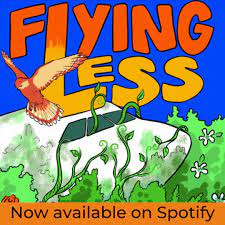For about fifteen years, I was directing and translating contemporary Russian drama – first as a theatre-maker, then as a PhD student and researcher.
One meeting at the University of Oxford changed everything.
In early 2019, the discourse around flying less to reduce our ecological footprint on the planet had made me think a lot about my own flying habits – a modest once or twice a year. Yet I took a decision to take my next trip to Russia by train. But individual action did not seem sufficient, so I decided to bring it up at the large Steering Committee meeting for the project I was working on – Creative Multilingualism (University of Oxford).
I can now acknowledge that I hadn’t put much thought into how I was going to persuade my colleagues that flying less was going to benefit them and the global community at large. It was more of an emotional appeal that I made in the ‘Any Other Business’ section of the meeting! While everyone was sympathetic with the ethos of flying less, there were a number of objections which will be all too familiar to anyone advocating for flight reductions. Broadly these can be grouped into two categories. The first is to do with institutional (or sectoral) realities. Some colleagues pointed out that Creative Multilingualism had already factored in international conferences, so we had to deliver – and that the time for potential change comes at the grant-writing stage.
The second – and I do not mean any disrespect – is an aspect of privilege, along the lines ‘I love taking the train to Italy but it’s not convenient, it takes much longer than a plane’. It feels uncharitable to argue against the second point since it is, of course, correct that it is easier to hop on a plane especially when aviation is untaxed and therefore usually cheaper as well as faster. Nevertheless, as a starting point, I like to acknowledge that anybody who uses aviation is within the privileged 2%-4% of the global population who use planes – a global minority.
Given that aviation is the single most high-carbon activity an individual can do – each return flight to New York is responsible for the melting three cubic metres of Arctic ice (or equivalent) per passenger – it is important to reconceptualise flying. We need to start thinking about flying consciously – only fly if it is intrinsic to the common good. Only fly if the benefit it brings to the common good is greater than the climate harm it will cause. There will be cases when flying is permissible, but not nearly as many as the number of flights currently taken by mostly Western academics, those who already have privilege.

So…. back to that meeting in 2019, in which I invited our project to turn to Flying Less. It led to a co-authored blog – although the people who were most resistant to the idea of Flying Less didn’t agree to contribute. However, encountering this kind of resistance can be valuable, or lead to new initiatives. For me, it led to meeting and collaborating with colleagues in various disciplines – transport scholars, experimental psychologists, climate computing scientists and professional staff in the sustainability services, who wanted greater action at our institution. We founded the Oxford Flying Less Group. The group is grassroots, unincorporated – basically a Twitter account and a small group of enthusiastic staff who agree to spare a bit of time to advocate for Flying Less. By the end of 2020, I started working as a postdoctoral researcher in the Transport Studies Unit at Oxford – a fairly dramatic and unexpected mid-career shift from Humanities into Social Science. Now in 2022, I am looking for ways to combine my interests – which isn’t straightforward as I work at the intersection of the arts, humanities and social science. I continue to voluntarily manage the Oxford Flying Less Group, although I am no longer working at Oxford but I’ll happily continue to steer the group as long as needed, or until another Chair emerges to take the reins. We always need fresh ideas and enthusiastic staff and students with energy and a small amount of time – so be in touch if that’s you!
To date, we have achieved a few valuable outputs by raising small pots of funding from the Green Travel Fund, thanks to the support of the Environmental Sustainability Team at Oxford (thank you, Adam, Harriet and Joanne!), as well as by offering our own time voluntarily:
- A pilot study about flying at the University of Oxford;
- The Oxford Flying Less podcast;
- A presentation to the Oxford Conference of Colleges about Flying Less, the first time this association of colleges has ever formally considered whether flying should be part of their sustainability remit;
- Advising on the Climate Neutrality Forum in 2021, to showcase a multi-hub conference model which is flightfree;
- Writing a ‘Best Practice Guide to Virtual/Hybrid Conferencing’ for internal use at the University of Oxford.
We hope to continue inspiring individuals to advocate for less flying.
What actions should/will the Oxford Flying Less Group take next? Watch this space.
Why not listen to the full series to get inspired about what you can do individually or through collective action, to achieve true sustainability at your own institution:
Oxford Flying Less podcast – a podcast created by the Oxford Flying Less Group, commissioned by the School of Geography and the Environment in collaboration the Environmental Sustainability Team (University of Oxford).
Episode 1 – Why do we fly and could we fly less?
Episode 2 – Decarbonising conferences.
Episode 3 – Flying Less research?
Episode 4 – Aviation and the case for Absolute Zero
Episode 5 – How to thrive when Flying Less? Staff Profile: Dr. Michele Veldsman, Experimental Psychology (Oxford)
Episode 6 – How to thrive when Flying Less? Staff Profile: Professor Hannah Knox, Anthropology (UCL)
All episodes available on iTunes, Spotify and Anchor by searching for Oxford Flying Less.


